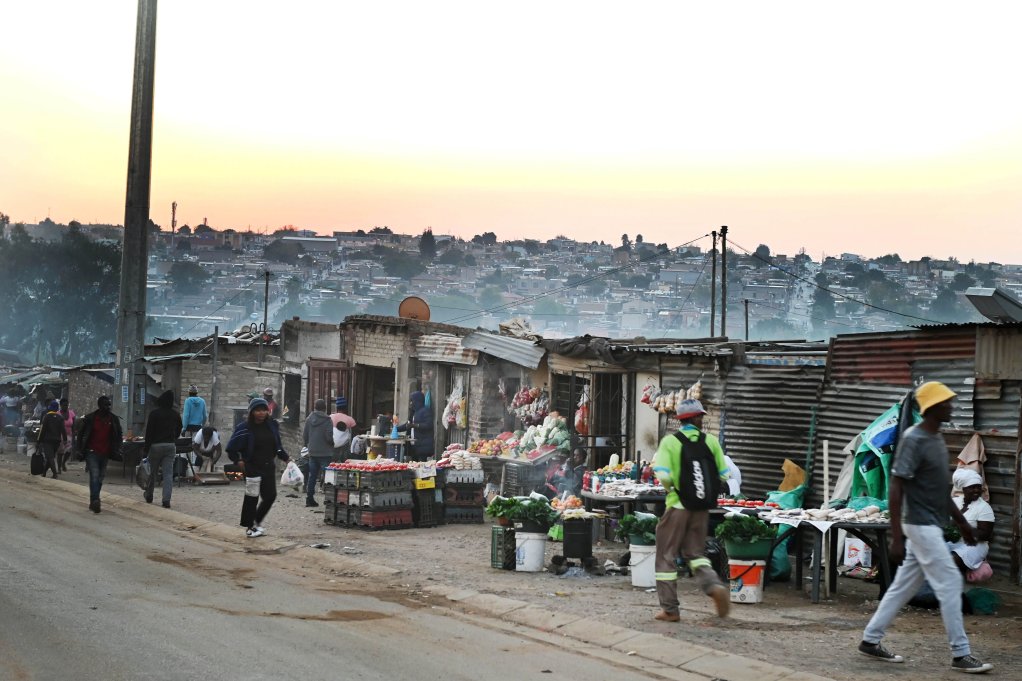TIPS report on small businesses shows informal sector is still lagging


Over 30% of informal businesses worked outside (at an open market, taxi rank or sidewalk)
Photo by Bloomberg
Available data suggest that formal small businesses contributed 19% of GDP and 33% of employment in 2023, according to nonprofit Trade and Industrialist Strategies’ (TIPS’s) ‘State of Small Businesses in South Africa’ report.
The report – a special edition of TIPS’s Real Economy Bulletin – summarises the informal available information on the number of small businesses, in total and by industry and province; their contribution to GDP and employment; ownership by race, gender and age; and access to skills and infrastructure.
For the formal sector, it also reviews the available data on the sector’s investment and profitability. The analysis is primarily based on household surveys and financial data through 2024.
The report shows that the informal sector generated just under 5% of GDP but provided 17% of employment, mostly in the form of own-account workers, who operated microenterprises with no other employees.
Formal small employers have seen a decline in both numbers and employment since the 2020 Covid-19 downturn.
In contrast, formal own-account workers and informal businesses have more than recovered, the report finds.
Whites owned 38% of small formal businesses in 2024, although they comprised only 7% of the working age population.
Fifteen years ago, whites owned 57% of small formal businesses.
African women owned only 13% of small formal businesses in 2024, although they made up 41% of the working age population.
The median age of formal business owners is 47, ten years more than for waged employees.
Value added by formal small business reportedly dropped 7% in 2023, presumed to be largely owing to loadshedding and slow overall economic growth.
Small business in South Africa has long lagged far behind that of other upper middle income countries, the report points out.
Only about 6% of all working age adults are employers or own-account workers in South Africa, compared with 20% in other upper middle income countries outside of China, and 27% in China.
The largest sectors for small formal business are commercial services and trade, followed by manufacturing.
In the informal sector, trade is far more important, followed by community services and construction, the report outlines.
The median income for formal employers in 2024 was R15 000 a month, compared with R10 000 for the self-employed.
It was R4 800 for waged workers in small formal business and R6 000 in large businesses.
Median incomes in the informal sector ranged from R5 000 for employers to R2 000 for waged workers and only R1 200 for own-account workers.
In the lowest-income 60% of households, only 8% said earnings from a business formed their most important income source.
In the richest 10% of households, 17% said most of their income came from a business.
Small formal businesses owned around 20% of private formal-sector assets in 2023.
In contrast, most indicators suggest informal businesses had almost no assets at all.
In 2024, Gauteng, the Western Cape and KwaZulu-Natal accounted for 74% of formal small businesses, compared with 58% of the working age population and a similar share in informal businesses.
The number of formal employers has grown steadily only in the Western Cape.
The provincial spread of informal business is proportional to the population, the report shows.
Waged workers in small formal business were half as likely to be union members as those in larger companies, with virtually no union members in the informal sector, according to the report.
Smaller formal businesses were considerably less likely than larger ones to provide retirement or medical funds, or to meet requirements in the Basic Conditions of Employment Act.
In 2024, 22% of formal own-account business owners had graduated university, up from 17% in 2009.
For formal employers, the share had risen from 13% to 17%. In contrast, only 5% of waged workers in small formal businesses had a degree in 2024.
Under 5% of informal business owners had a degree, and only 30% had at least matric, compared with 55% of their formal counterparts.
According to Statistics South Africa, 50% of informal businesses operated in their own homes in 2023.
Over 30% worked outside (at an open market, taxi rank or sidewalk), 11% in someone else’s home, and only 5% in a non-residential building.
For business owners in the poorest 60% of households, an estimated 90% had electricity at home but only 60% had running water.
Just 14% had a computer, although 80% had a smartphone.
Article Enquiry
Email Article
Save Article
Feedback
To advertise email advertising@creamermedia.co.za or click here
Announcements
What's On
Subscribe to improve your user experience...
Option 1 (equivalent of R125 a month):
Receive a weekly copy of Creamer Media's Engineering News & Mining Weekly magazine
(print copy for those in South Africa and e-magazine for those outside of South Africa)
Receive daily email newsletters
Access to full search results
Access archive of magazine back copies
Access to Projects in Progress
Access to ONE Research Report of your choice in PDF format
Option 2 (equivalent of R375 a month):
All benefits from Option 1
PLUS
Access to Creamer Media's Research Channel Africa for ALL Research Reports, in PDF format, on various industrial and mining sectors
including Electricity; Water; Energy Transition; Hydrogen; Roads, Rail and Ports; Coal; Gold; Platinum; Battery Metals; etc.
Already a subscriber?
Forgotten your password?
Receive weekly copy of Creamer Media's Engineering News & Mining Weekly magazine (print copy for those in South Africa and e-magazine for those outside of South Africa)
➕
Recieve daily email newsletters
➕
Access to full search results
➕
Access archive of magazine back copies
➕
Access to Projects in Progress
➕
Access to ONE Research Report of your choice in PDF format
RESEARCH CHANNEL AFRICA
R4500 (equivalent of R375 a month)
SUBSCRIBEAll benefits from Option 1
➕
Access to Creamer Media's Research Channel Africa for ALL Research Reports on various industrial and mining sectors, in PDF format, including on:
Electricity
➕
Water
➕
Energy Transition
➕
Hydrogen
➕
Roads, Rail and Ports
➕
Coal
➕
Gold
➕
Platinum
➕
Battery Metals
➕
etc.
Receive all benefits from Option 1 or Option 2 delivered to numerous people at your company
➕
Multiple User names and Passwords for simultaneous log-ins
➕
Intranet integration access to all in your organisation


















